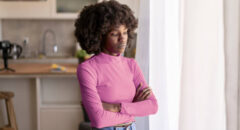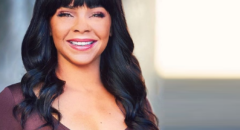 I haven’t been quite right since the abuse.
I haven’t been quite right since the abuse.
I haven’t been quite right since the accident.
The sexual abuse and later, rape, I experienced when I was younger has created emotional and spiritual blocks for me in most of my relationships. I either become too needy with people I’ve deemed safe or too “hard” and “resistant” with those who I’ve decided are unsafe. While I’ve gotten better over the years, I still have trigger moments.
Since being in a car accident a little over 10 years ago, I’m a terrible passenger in the car. When I’m with someone who’s driving and they turn a curve, my body and mind reacts as if I’m turning that curve on the back road we were on in Dallas when another car slammed into us and sent us spinning and flying off the side of the road. When the headlights of cars are coming toward me today, all my soul can “see” are the headlights of the car that hit us eleven years ago.
MUST READ: 10 Years After Hurricane Katrina, PTSD Still On The Rise
My body, my mind relives both my abuse and this accident as if time has not passed. I’m in perpetual fight or flight mode.
This is what Post Traumatic Stress Disorder (PTSD) looks like in me.
I was both amazed and disturbed by the response to an episode of Scandal a few weeks ago. For those who don’t watch, the main character, Olivia Pope, had been kidnapped by a few individuals who wanted to have control of the President and White House (the President is in love with Pope). She’d been placed in a body bag with the dead body of her elderly neighbor (an innocent bystander in the drama). She’d been forced to kill or risk being killed. Being a savvy “fixer,” she was forced to set herself up to be sold on a global auction block in order to hopefully, if the right person purchased her, escape alive. As with most television shows, this storyline had to come to some kind of 3-4 episode resolution so she was finally “saved” and made it back home. Now that she has finally returned, she is scared and somewhat unstable. In one of the final scenes of an episode that aired a few weeks ago, Pope appears unmoved by the sappy and somewhat self-aggrandizing “But I went to war for you” speech from her married ex-lover who just happens to be the President. Probably because in that moment, the real question for her was, “how do I stop being so scared?”
I totally got it.
MUST READ: Pregnant Woman Killed By Fiance’ Who Suffered From PTSD
Other people? Not so much.
“Ingrate!” people called her across my timeline. “Spoiled!” others said. “But he did all of that and she’s going to kick him out?!” questioned many.
I couldn’t help it. I was shocked. Clearly, these people do not know how PTSD really works. Maybe they missed her flashbacks, her excessive drinking and minimal eating, her carrying a gun, or her shaking hands?
Could it be that the fierce strength she’s displayed (outside of her love life anyway) up until that point has clouded their perspective of her that much?
Yes, I know it’s just a show. Lol.
But the whole story line got me to thinking about the reactions of real people outside this fictional world created by Shonda Rhimes and her writing team.
Sadly, it’s not much different.
MUST READ: Open, Honest Discussions With Your Doctor Made Easier
Black women, in particular, are generally perceived to be stronger than most other groups. It’s a kind of stereotype that so many of us have bought into. “Never let them see you cry or sweat,” used to be my mantra. Nevermind that I needed to cry, that my heart was about as soft as they come, that my sensitivity was part of who I was authentically and was meant to be gift not the curse I’d made it out to be; that I’d allowed people to tell me it was. Janie, in Zora Neale Hurston’s “Their Eyes Are Watching God” explained it like this: “Black women are the mules of the world.” Mules carry everything on their backs. As much as folks can pile on, a mule will hold it all steady and push that weight along the path. So many of us all too often carry not just our own weights but the weights of others. But because we do so wearing the flyest white coat a la Olivia Pope or huge, albeit fake, smiles, no one believes that we are hurting.
But we are.
This “strong woman” perception is so pervasive that even when Black women exhibit clear signs of PTSD, the illness is not often addressed as the problem—our character is. Our pain is reduced to a personality defect.
“You just need to get yourself together. You’re too much.”
“You’re just being emotional. You’re too sensitive.”
“It happened like ten years ago. Get over it already.”
“You’re so angry.”
I often wonder if there is a connection between the two most common stereotypes of Black women: “angry” and “strong.” Both seem to be convenient ways to dismiss real, deep-rooted pain and to give those who often are our violators (physically, emotionally, psychologically or spiritually) permission to keep piling their stuff on us.
Oh and I can’t forget my church folk,
“You just need to pray about it.”
Yes, I do. Lord knows I pray and you know what? God is a healer, for sure. He has taught me in scripture to “cast my cares on Him” (see 1 Peter 5:7). Though my hands may shake and my emotions may rage and fear may creep in on every side; though the nightmares may come and the tears may fall, I pray.
Why do you think I’m not dead yet?
MUST READ:My Story: “Let’s Not Forget Those Who Suffer From Their Own Daily Battles”
In other words, for those like me who are believers and who also live with some degree of PTSD, when the symptoms manifest, it’s not always a function of a lack of faith or prayer.
Here’s a better response: “How can I walk with you through this?”
But of course, that might mean you’ll have to risk helping me unload. A messy, messy endeavor, for sure.
Essence Magazine recently featured a study on PTSD conducted on mostly African Americans and the results are so startling. Roughly 30 percent of respondents had symptoms consistent with PTSD—a rate as high or higher than that of veterans of wars in Vietnam, Iraq and Afghanistan. A third of the women studied had endured sexual assault while others had experienced violence and psychological trauma.
And yet, like so many of those commenting on the Olivia Pope character, too many people oversimplify or disregard this widespread issue. Even those of us living with PTSD run from accepting it. I don’t know how many times I’ve chosen to ignore my fear responses. Too many times I’ve decided to call it something else: “a bad day” or “someone else’s fault.” At the end of the day though, not accepting where you are (a person working through this particular area of her life) is a surefire way to ensure you won’t ever get where you need to be (healed).
Yes, there’s quite a bit of research and information out there about the various sources of and “solutions” to PTSD. There’s even some fascinating research done by Joy De Gruy on PTSS (Post Traumatic Slave Syndrome). But the last thing I want to do is exasperate any real or perceived pathologies of Black women. There’s enough of that already. Here’s the point, I guess. A significant enough number of Black women have PTSD. Others of us don’t. But for those of us who do, I think it’s important to be aware of the disparities in how PTSD is viewed, discussed or handled in Black women as opposed to other groups.
On television and in real life.
Tr acey M. Lewis-Giggetts is a writer, educator, and publisher based out of the metro Philadelphia area. Most of her work probes the intersection of faith/spirituality with social issues related to identity and culture (race, class, gender, etc.). Tracey’s writing has appeared in numerous publications online and in print. Read more at www.traceymlewis.com.
acey M. Lewis-Giggetts is a writer, educator, and publisher based out of the metro Philadelphia area. Most of her work probes the intersection of faith/spirituality with social issues related to identity and culture (race, class, gender, etc.). Tracey’s writing has appeared in numerous publications online and in print. Read more at www.traceymlewis.com.








